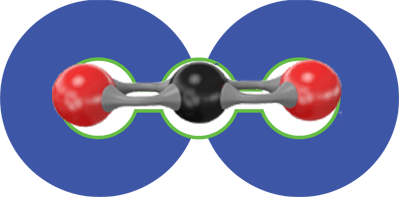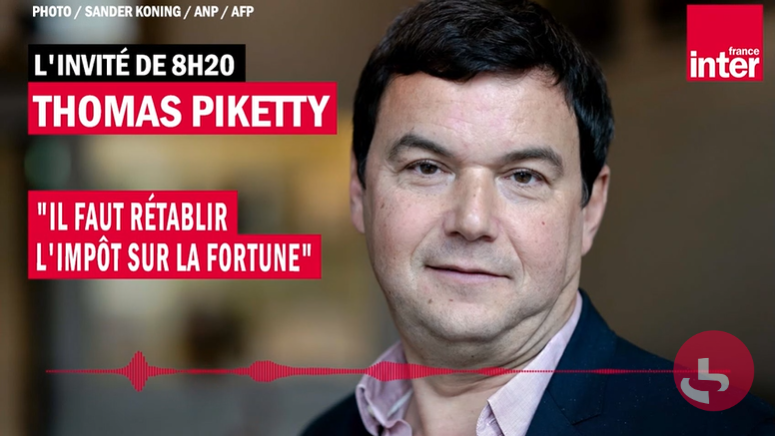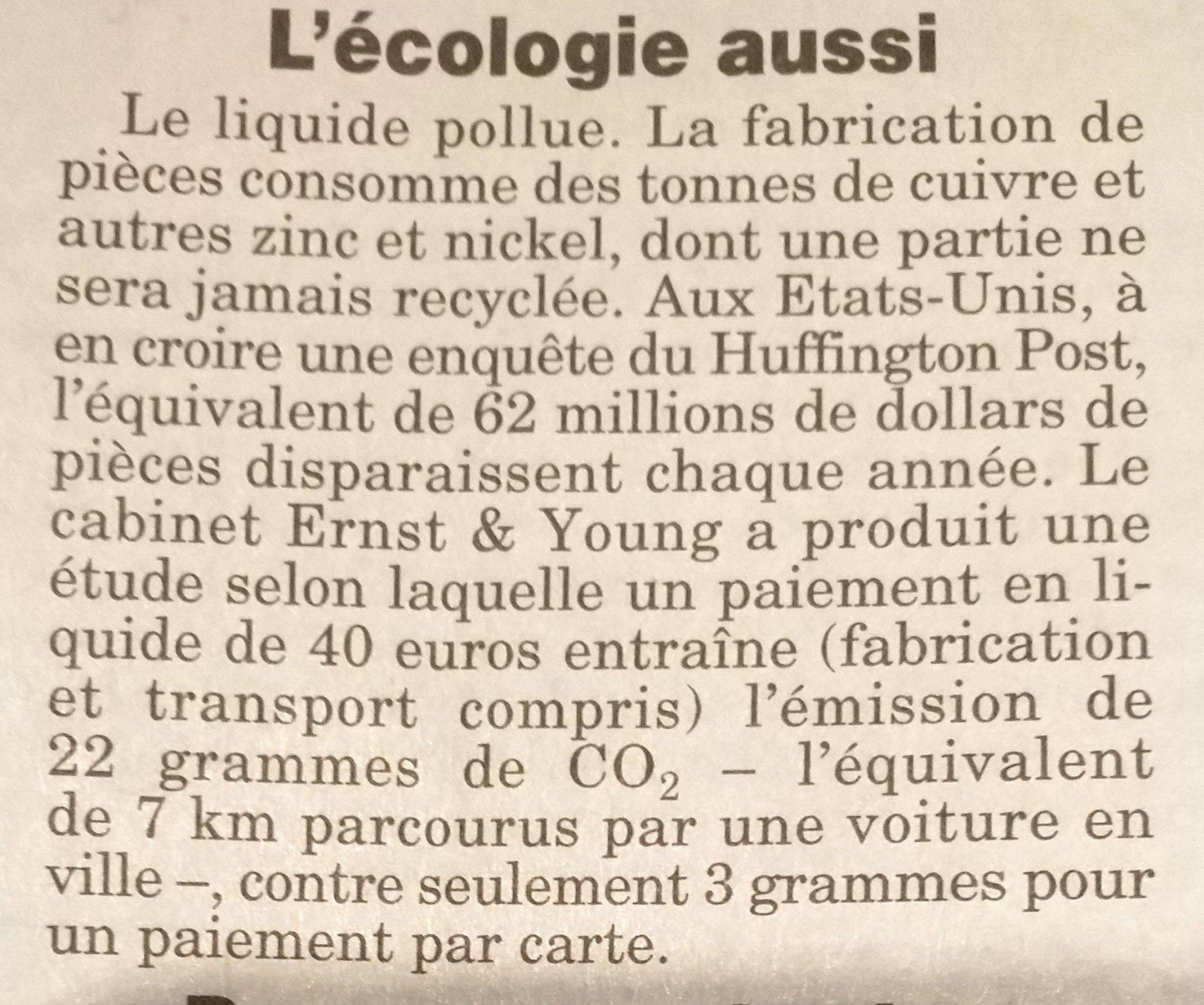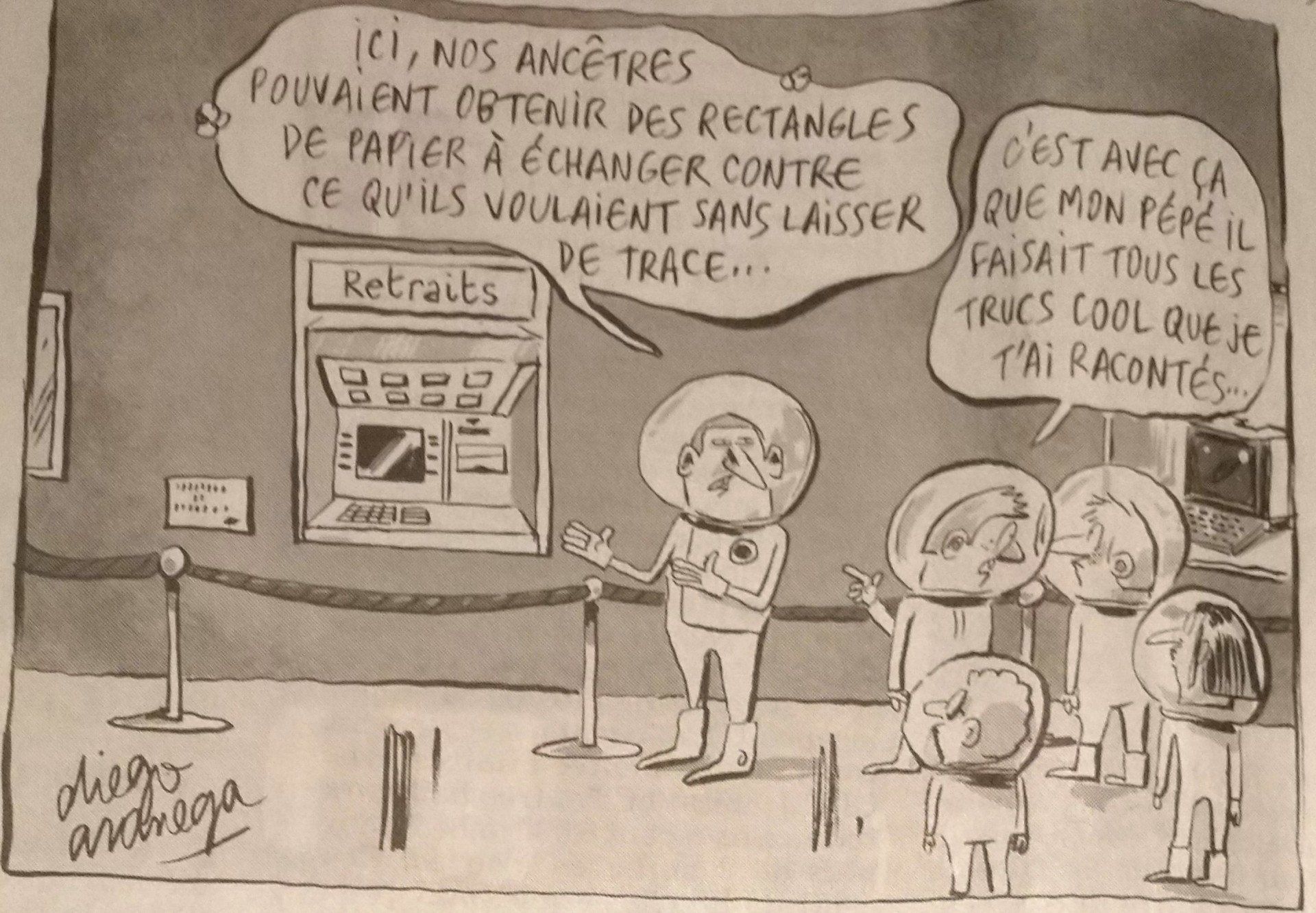What am I learning! Act here with news and press:
A proposal to index all resources of the individual carbon quota movement:
Article in La Provence-Vaucluse on January 28, 2025, the journalist clearly describes:
Article online in LeJournal.info by Valérie Cohen on the European Campaign against the Commission
First article of 2024 on the online media l'Yonne-l'autre, to remind that most French people are more sober than average and would receive an income through the implementation of the carbon account, good reading and good year of achievements:
Purchasing power and climate, a good demonstration in the daily Sud Ouest on December 11, 2023:

On December 4, 2023, La Croix published Pierre Calame's call for more democracy, which added a clear response to those who criticize the carbon account for offering the poorest the opportunity to resell their unused quotas (the basis of the social dimension of the carbon account mechanism):
On October 30, Le Monde published a column by economists:

New Ouest-France column on the weakness of "French ecology" on 2/10/2023:

New analysis of the PISANI-MAHFOUZ report in the letter from Agir pour le Climat: this report should guide our leaders who seem to have scorned it, its figure of €67 billion/year is explicit, its perspectives are well detailed in this analysis which highlights the profitability of investments if we set up a carbon currency.
A call to action published by Le Monde on August 23, 2023, written by Pierre Calame: we must debate in order to act!

To describe the carbon account, Armel Prieur's political novel "Satis" was published by Geste - la compagnie du livre. Order possible HERE.
A novel to save the world?
Are we all disappointed with some aspects of democracy?
Here is a novel that offers us a country in evolution where citizens organize themselves to balance. And it's not sad: there are opponents, disadvantages to catch up on, successes, surprises, currencies, accidents, lovers, economic issues and even the return of a famous dead man with his comic wisdom. We give ourselves the means to avoid climatic and social chaos, each page is a nod to current events.

A very accomplished documentary by Arte on June 15: https://www.arte.tv/fr/videos/112597-054-A/un-compte-carbone-pour-traquer-ses-emissions-de-co2
The article published in LeJournal.info on June 12th is reassuring for consumption forecasts in 2050: for the balance of the planet we will have an annual footprint of 2t CO2e per person instead of the current average of 9. This is worrying!
But society will have been decarbonized by the leverage effect of the carbon account and we estimate that it will be equivalent to 6t today, these are some rough figures that suggest it. Specialists warn that food will still decrease less than this forecast and that clothing is weaker than mentioned.
Carbon: fromux tons of comfort! (lejournal.info)
The numbers are refined in
the editorial of 14
June.
On June 1, the online magazine Vert Le Média produced a nice description of the carbon account and its issues and advances:
Excellent article descriptif du compte carbone dans le nouveau journal en ligne www.lejournal.info :
https://lejournal.info/article/titre-article-idee/
Climate Poetry: This is the crazy bet launched by Francine to address the climate and its concerns with poets in the annual poetry festival of Belleville : after the workshops on May 5 and 11 will allow us to prepare, we will declaim on Saturday May 20 at 11 a.m. at the poetry space on Place Frehel, as part of the Grand Poetry Slam hosted by Pilote and his team; to your rhymes and alexandrines...
An example: "two birds with one stone", a poem of 10 quatrains, to be repeated in a group...

Colloque du défi climatique ce jeudi 27 avril à 18h30 à l'Académie du Climat et visio, nous accueillions les compteuses du carbone, Marie Gaborit fondatrice de Toovalu spécialiste de la comptabilité analytique du carbone, Mathilde Aubry de Carbo, puis notre guide Pierre Calame pour son nouveau livre "Petit traité de gouvernance" et la démarche juridique de l'ONG Notre Affaire à Tous représentée par Justine Ripoll. Replay sur https://www.facebook.com/armel.prieur.31/videos/6112290775544718/ commenté sur le site comptecarbone.cc
West France published in January 2023 for a universal sobriety income to initiate carbon reduction
The Carbon Account Allies Symposium (December 1, 2022) fulfilled its objectives of highlighting the need for a referendum to launch the process without delay! Online report HERE.
Article from the AEF Dispatch HERE
Tribune by Pierre Calame in Le Monde on October 12, 2022
Broadcast on August 29, 2022 of a platform for fossil rationing:

A very good initiative from the newspaper Le Monde: offering online a
simplified assessment of its carbon footprint, it is in collaboration with ADEME by reusing the engine of
www.nosGEStesclimat.fr
If you find it too simplistic (despite its ease of rapid calculation) you can supplement it with our
Carbometer.
La lettre hebdo 345ppm a réalisé un podcast très réussi sur les quotas carbone, une durée de 30 minutes qui fait le tour de la question...
The contents and replay of the conference are online at www.comptecarbone.cc/colloque

A little extra for those interested, Alain Risbourg will stay in the room from 6:30 p.m. to 9 p.m. to host the game of the Ecological Renaissance Fresco, a sharing to project oneself into the post-carbon world, desirable and resilient, by composing action plans. Registration on site.
Let us welcome the NANTES CALL prepared on the occasion of the Climate Chance congress on March 7-8:
The "Dare the territories!" movement hosted a workshop there on the afternoon of March 7, a two-hour video of which can be found on the
site.
The carbon account gave rise to a few minutes transcribed
HERE.
Stopping fossil fuels faster than requested by the IPCC is what XR Ukraine is demanding:
A double interview by the Narbonne collective ECO-LOCALif you have 25 minutes to spare during your next hike, (recorded before Cop26 but broadcast after: you will find the questions from before and the follow-ups from after)...
The quarterly Alters asked us on the suggestion of Ecolocal, it results in a nice understanding by Didier Raciné:

Did the Don't Look Up phenomenon impress you? See François Gemenne's analysis in our report on science, politics, the media...
Vous croyez que «Don't Look Up» est un peu exagéré? Dites-vous que la réalité dépasse la fiction. pic.twitter.com/1i2IRgWC27
— Loopsider (@Loopsidernews) January 10, 2022
What am I learning! Ouest France has published our column: choosing between carbon tax and our carbon account redistributive mechanism: feel free to comment...
France2 invited this Thursday, November 18, the Nantes speaker Yannick Roudaut to explain his vision of individual carbon quotas, with good examples and enthusiastic comments from the audience. The four experts validated the proposal and the survey of a sample (to be specified) obtained 52% favorable opinions, very good for a proposal that was not very explained in the short time that Yannick Roudaut had. In the replay (which is no longer online), he is the last speaker, we can follow him after 1h46'44 or 22h55:
On October 9, Ouest France published the column calling on global decision-makers to commit to the responsibility of ensure the return to thebalance of the planet:

A new news blog to report and follow closely: https://solastalgie-merci.fr/blog/le-compte-carbone-solution-universelle-pour-reduit-nos-emissions/
The monthly Le Drenche asked us for an article on the carbon tax for its September 2021 issue based on the conclusions of the Seats Climate. In addition to purchasing on https://ledrenche.ouest-france.fr/boutique/, you must subscribe to the DRENCHE which always publishes the FOR and AGAINST of each major social issue. Exceptionally we offer the 4 pages that concern us:
The carbon quota mechanism arrives in the presidential debates by the Mediapart evening of September 10, 21, it is Delphine Batho who puts it in opposition to the carbon tax:
With climate change, are we in a madness? But what kind of madness? The Yonne newspaper has taken up the text on social madness...
A very detailed description of the carbon accounting mechanism is at the heart of the book COMPTER, between proposals for a heart bank and shared teleworking, between dystopias on what life will be like in 2050 or the mystery of the caleurs
The new report of the High Council for Climate comes out on June 30, 2021 and provides tables and values of the highest interest: Territorial emissions are estimated at 436 Mt eqCO2 for 2019, including 31% from transport, 19% from industry, the same for agriculture, 17% for buildings, 10% for energy transformation and 4% by waste. They are reduced by 7% by land and forests. To this must be added 6% due to international transport and 52% for net imported emissions!
It confirms what was updated by the climate conference, the national footprint is not 11.2t (according to the 2019 report) but 10t eq CO2/person/year.
Climate, climate... but do we talk enough about protecting biodiversity (the scientists' warning cry in the file below)? Is the fight against climate likely to delay the fight for biodiversity? With the mechanism of shrinking individual carbon quotas, we advocate redistributive rationing: this model can be applied in the process to biodivercidal products that we find hard to do without, plastics, deodorants, pesticides, wild picking, clear-cutting for construction wood... Let's quickly test the redistributive rationing supported by the carbon account!
The European Union launched its consultation under the title of Conference for the Future of Europe, we made the proposal of a European coordination of carbon agencies, relayed by a specific site:
The press puts carbon quotas in the spotlight following the climate conference: La Croix and then Ouest France publish the columns of Pierre Calame:
The series of 9 video debates with the finest experts on climate and the economy began on Thursday, February 11 with the President of the High Council for Climate and the President of ADEME invited by Christian de Perthuis under the chairmanship of Jean Jouzel. These climate conferences hosted the carbon account in sessions 7 & 8 on March 25 and April 1. All information and registration on the conference website:
Science Fiction associated with researchers, this is what the book "Our Futures" (ActuSF edition, 529p.) published in August 2020 offers with the analysis of carbon quotas by Audrey Berry, researcher in economic sciences, project manager for the High Council for Climate. Her text in pdf attached, especially for you, interesting for its approach on social justice:
The youth movement for carbon counting initiated by Vianney already has 45 participants working in 13 groups. Every week, video discussions are organized on the main issues of this mechanism. A group to be strengthened: what scale of over-quotas should be proposed for people who are short of carbon for reasons beyond their control.
Call for debate published by Ouest France on November 10, 2020
Convergence: A similar proposal was made some time ago by Yannick Roudaut on CQFD, important to reread for the reference to the Universal Declaration of Human Responsibilities which is dear to us.
Tribune from August 13, 2020 in Le Monde: response to Mr. Castex on green growth and the territory, the balance will come from an equality of individual quotas which, by reducing from year to year, will restore to the territory its position as a pivot of new development without greenhouse gas emissions...
A beautiful one tribuneand by Pierre Calame on June 26, 2020 to thank the citizens of the CCC who were somewhat victims of a good intention (making them work in 5 groups for greater efficiency, which produced a series of nice measures rather than a global proposal), he discusses what a climate referendum could be where the social path is the allocation of individual quotas...
The World Tribune published on March 6, 2020 on the occasion of the 6th session of the CCC. Its text here.
We responded on April 4, on the theme of "sustainable economy", here is the contribution.
Economists and scientists around Dominique Bourg propose a plan for a Return to Earth on April 16, 2020, published here And hereAmong 35 very comprehensive measures up to international relations, measure A4 proposes a progressive capping of energy/material expenditure, followed on an individual account, with regional equalizations.
-
Interview with Dominique Méda from March 18, 2020 in "Pour l'Eco"
-
On 4/23/2021 and 4/27/2020 on France Inter, economist Thomas Piketty asserts that it will be necessary to track the carbon of all citizens, through a sort of carbon map, without hiding the technical difficulty and the question of trust: he compares to the outcry that the income tax project had provoked a century ago, we must build trust; listen here in particular to minutes 9 to 11.
-
In issue 294 of Le 1, find Dominique Méda and Dominique Bourg, who confides "we propose that the individual quota be submitted to referendum"... to read (and support) here.
-
The Europhile radio station EURADIO broadcast the debate of March 12, 2020: Armel Prieur was invited to the Géopolis center in Brussels to detail the Carbon Account project and respond to the objections raised by this initiative. Here is a presentation of the Earth-stove diagram from Will Steffen's study, to download in our studies.
Delphine Batho (president of Génération écologie and EDS MP) and François Ruffin (LFI MP) are proposing a law for individual air quotas entitled "Individual carbon quota" on June 30, they explain it in a press conference.























